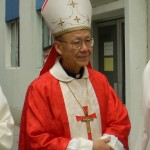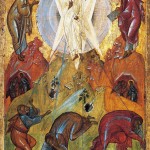
I’m still working on reading through Cardinal Tong’s 8,000-word editorial in the Kung Kao Po (which, as it came to my attention, has been translated for UCA News), but as I have been reading and having conversations about this, it also occurred to me that I’m starting to develop something by way of a blog style that I hadn’t expected to develop before joining Patheos Catholic.
It’s that this is just a log on the web of my reading as a person.
I said originally that I was going to blog as a person who happens to be Eastern Catholic practicing an Asian American politics. What I did not expect was that this is becoming a sort of a record of how I am reading texts across ecclesial circles. To that end, I’ve been reading Pope Francis and his stuff on the piecemeal third world war, as well as Archbishop Job of Telmessos, and I’ve also read Cardinal Zen in the past and will be reading Cardinal Tong in the imminent future. I also promised in my piecemeal third world war piece to read Pope Francis on the Eastern churches at World Youth Day, and I will certainly get around to it. Two weeks ago, I also did a reading of Ivanka Trump’s Republican convention speech.
I am not saying that I am a particularly good reader. On the various groups on which I post (and the persons there often tend to be kind and generous with their commentary), I have sometimes been faulted for perhaps not reading as carefully as I should, even though I have tried my best to be a careful reader.Perhaps one of the helpful things about blogging for me has been for other persons, who are also readers, to criticize my reading. For example, an astute reader pointed out that in my Job of Telmessos post, I failed to adequately distinguish between ‘Moscow as Third Rome’ and the contemporary ‘Russian World’ ideology and did not point out that the ‘Moscow as Third Rome’ point came from the interviewer, not Archbishop Job. These comments sent me back to the interview itself, where I found that he was indeed correct to make these points, but that these points also did not seem to devastate my reading at all; after all, Archbishop Job answers the question about Third Rome in an unexpected way, and both of them seem to agree on a critique of an expansionist contemporary Russian ideology. In other words, sometimes I agree with my readers’ criticism, and at other times I do not, but what I like about the process is that we are reading together, challenging each other to read more closely.
I’m saying all this because someone commented on one of my social media platforms that in order to read Cardinal Tong correctly, we must ‘read between the lines.’ It occurred to me that I disagree with this statement. Maybe it has to do with the way my liberal Catholic high school taught me to close read, but I don’t think consciously reading between the lines is a good thing to do. It’s one thing to unconsciously read between the lines and get called out for it (as I have been, and will continue to be, and for which I thank my readers), but it is another thing entirely to consciously and purposefully read into a text what I want it to mean. In other words, I recognize that I probably do that unconsciously, which is why I need your criticism, but I do not think it’s a good thing to do that consciously. In fact, this is why I write sometimes about my own ecclesial and academic position as I write; I want to be frank with my own readers and help them to see how I am reading as a person, and perhaps they can tell me where I have been blinded because of where I am personally. My editor Sam Rocha calls this the agon of the blogosphere, and I must admit that I quite like it. It pushes me, as another critic of mine says, not to ‘sound off’ on ecclesial politics, but to read ecclesial political texts closely.
In this way, I’m also influenced by a book for which I helped to collate a symposium on Syndicate Theology: Thomas Pfau’s Minding the Modern. To be quite frank, I really struggled with reading this book because Pfau’s writing is so meticulous and careful that it is easy to get lost in the trees and lose the forest. But as I was struggling, here’s a passage that helped me to see the light (the passages he cites are from Gadamer’s Truth and Method):
Our relationship to concepts thus should mirror that to other persons; that is, it ought to rest “not on the subjection and abdication of reason but on an act of acknowledgement and knowledge.” Hence, whatever intellectual authority concepts possess “cannot actually be bestowed but is earned, and must be earned if someone is to lay claim to it. It rests on acknowledgement and hence on an act of reason itself.” For that to happen, and for us to inhabit concepts as living frameworks with a deep history, rather than occasionally wielding them as tools (such as resonates in the sadly common phrase of “applying a theory”) also means to conceive of rationality not as a correlate of self-possession but of what, echoing Hegel, Gadamer calls “recognition” (Anerkennung). At issue here is a sustained, deliberative, and potentially creative reflection on the “antecedent probability” of a concept’s truth value along the lines explored by John Henry Newman in his Development of Christian Doctrine (18450 and further scrutinized in his Grammer of Assent (1870). (Pfau, p. 31, emphasis mine).
What does it mean to read as a person? It means that I – and therefore my blog – am never going to offer pronouncement as a truth that I possess. Instead, all I can do is to offer readings, engaging concepts in texts as they are presented by the persons who wrote them. I am in dialogue with a text, and a text is in dialogue with me, and as Pfau goes on to say in his book, concepts develop history because persons argue about how texts are read and this dialectical process helps a concept to grow its own history. There is nothing else that I can possibly offer as a person. If I were to come out swinging with my truth, it would not be an offering, but an imposition, and this, as Pfau suggests, is not the way of truth. As a wise Dominican priest (that is, those who truly work with truth) and I once discussed, to grasp on to a truth is already to have subjectivized it; if truth is objective, then it must be a mystery. The texts that I am reading explore these mysteries of truth, even political ones, and what it means to keep the truth objective is to say that I can only offer my subjective readings for criticism and nothing more. I hasten to add, of course, that this Dominican (as you may have guessed) has been very influenced by patristic theology and has a bit of a Byzantine flair to him.
Cardinal Tong has presented us with one such text. It has garnered many knee jerk reactions already, including mine. But now, let us read it together.
















